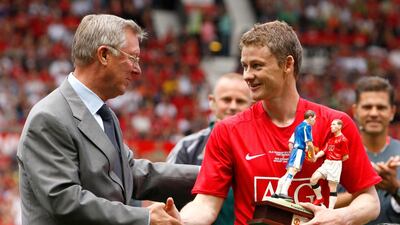Ole Gunnar Solskjaer will have to get used to the suspicion over the coming months that the Manchester United bench might be a little too big for him, given his restricted range of experiences as a manager.
He would be forgiven for smiling at the irony. His experience of that very bench is extensive. Indeed, he has spent rather more time sitting on it than he would have liked.
Solskjaer, appointed as United's interim manager following the dismissal of Jose Mourinho, watched a lot of football as a player from the red brick platform where the coaches and substitutes at Old Trafford are confined. And he watched, according to his manager throughout the 11 years Solskjaer represented United as a striker, with an unusually fine eye for detail and with an analytical mind.
Those were assets Alex Ferguson thought through the late 1990s and early 2000s would one day make Solskjaer an excellent manager. And they were qualities that made the Norwegian the perfect player to bring late into games that needed a spark.
There was a period when there was no more effective substitute in the game than the diminutive, quick-footed Solskjaer – a status the player himself sometimes reflected almost counted against him.
He seemed defined as a supersub more than he was defined as a superb striker.
He would certainly like to have played the full 90 minutes more often than 95 times out of his career total of 234 Premier League matches for United. He imagines he would have scored more than 20 Uefa Champions League goals for the club had he not made well over half his 77 European Cup appearances coming off the bench.
But what a supersub Solskjaer was.
“A terrific sub because he picks up the pace of the game straight away," Ferguson purred, never more amazed than on the February afternoon in Nottingham when the so-called 'Baby-Faced Assassin' came on with 19 minutes remaining on a muddied pitch against Forest and scored four times in an 8-1 rout.
United were on their way to a breathtaking treble that winter. The major trophy, famously, came to United via Solskjaer’s 93rd-minute winner at Camp Nou in the Champions League final.
He had been on the pitch 12 minutes. He had come on with United 1-0 down to Bayern Munich.
Twenty seasons later, Solskjaer has returned to United as manager. He will regard that elevation as a reward for the loyalty, devotion and professionalism he showed the club as a player even through those periods when he reckoned he was deserving of a more regular starting place than Ferguson granted him.
Ferguson, who retired in 2013, always appreciated him. He had a big say in the club giving Solskjaer a role as reserve team coach 12 months after he hung up his boots in 2007, with 91 United goals to his name from a career where his partners up front had ranged from Eric Cantona to Cristiano Ronaldo.
Solskjaer, now 45, appeared to take a Midas touch to his first senior managerial job. He took over at Molde, where he had played in his native Norway, and his first two seasons brought a pair of league titles.
“He did a great job at Molde,” said former England player Brian Deane, who managed Sapsborg in the Norwegian top flight during Solksjaer’s first spell coaching Molde.
“He tried to get the best young players in Norway there, and he could do because he’s got so much respect in Norway.”
That respect scarcely diminished when Molde were beaten to the league title in his third season in charge. He accepted a job in England soon after.
It was an unforgiving one, tasked with rescuing Cardiff City – to where he takes United on Saturday – from likely relegation in mid-season.They went down, and Solskjaer was dismissed after a poor start to their return to Championship football in 2014/15.
Since then, he has had three solid seasons back at Molde, to where he is expected to return in May, his caretaker shift at United completed. Solksjaer had little difficult persuading Molde he would be bettered as a manager by his experience at Old Trafford over the next five months.
He can certainly count on support, from the Old Trafford grandstands, and from the VIP seats. When he was starting out in senior management, Ferguson took a close interest in his progress, impressed with how he dealt with both success and with setback.
“As a human being he is first-class, stronger than people think,” Ferguson observed, “and he has a stubborn mind.”
That was regarded as a recommendation. United’s players will know quickly that behind the boyish face and the well-mannered bearing, Solskjaer is very much the boss.


